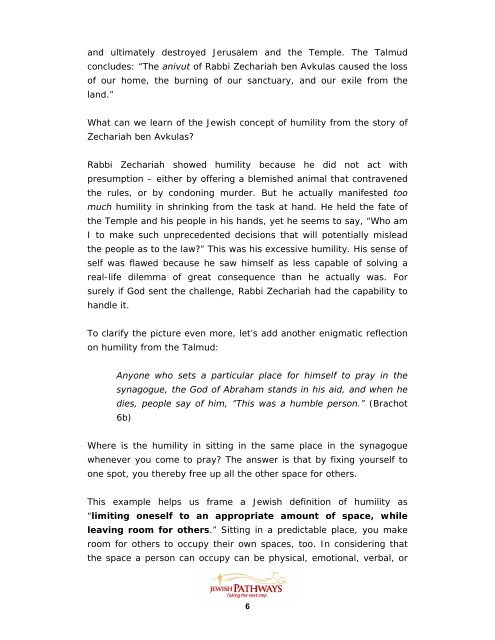Create successful ePaper yourself
Turn your PDF publications into a flip-book with our unique Google optimized e-Paper software.
and ultimately destroyed Jerusalem and the Temple. The Talmud<br />
concludes: “The anivut of Rabbi Zechariah ben Avkulas caused the loss<br />
of our home, the burning of our sanctuary, and our exile from the<br />
land.”<br />
What can we learn of the Jewish concept of humility from the story of<br />
Zechariah ben Avkulas?<br />
Rabbi Zechariah showed humility because he did not act with<br />
presumption – either by offering a blemished animal that contravened<br />
the rules, or by condoning murder. But he actually manifested too<br />
much humility in shrinking from the task at hand. He held the fate of<br />
the Temple and his people in his hands, yet he seems to say, “Who am<br />
I to make such unprecedented decisions that will potentially mislead<br />
the people as to the law?” This was his excessive humility. His sense of<br />
self was flawed because he saw himself as less capable of solving a<br />
real-life dilemma of great consequence than he actually was. For<br />
surely if God sent the challenge, Rabbi Zechariah had the capability to<br />
handle it.<br />
To clarify the picture even more, let’s add another enigmatic reflection<br />
on humility from the Talmud:<br />
Anyone who sets a particular place for himself to pray in the<br />
synagogue, the God of Abraham stands in his aid, and when he<br />
dies, people say of him, ”This was a humble person.” (Brachot<br />
6b)<br />
Where is the humility in sitting in the same place in the synagogue<br />
whenever you <strong>com</strong>e to pray? The answer is that by fixing yourself to<br />
one spot, you thereby free up all the other space for others.<br />
This example helps us frame a Jewish definition of humility as<br />
“limiting oneself to an appropriate amount of space, while<br />
leaving room for others.” Sitting in a predictable place, you make<br />
room for others to occupy their own spaces, too. In considering that<br />
the space a person can occupy can be physical, emotional, verbal, or<br />
6
















